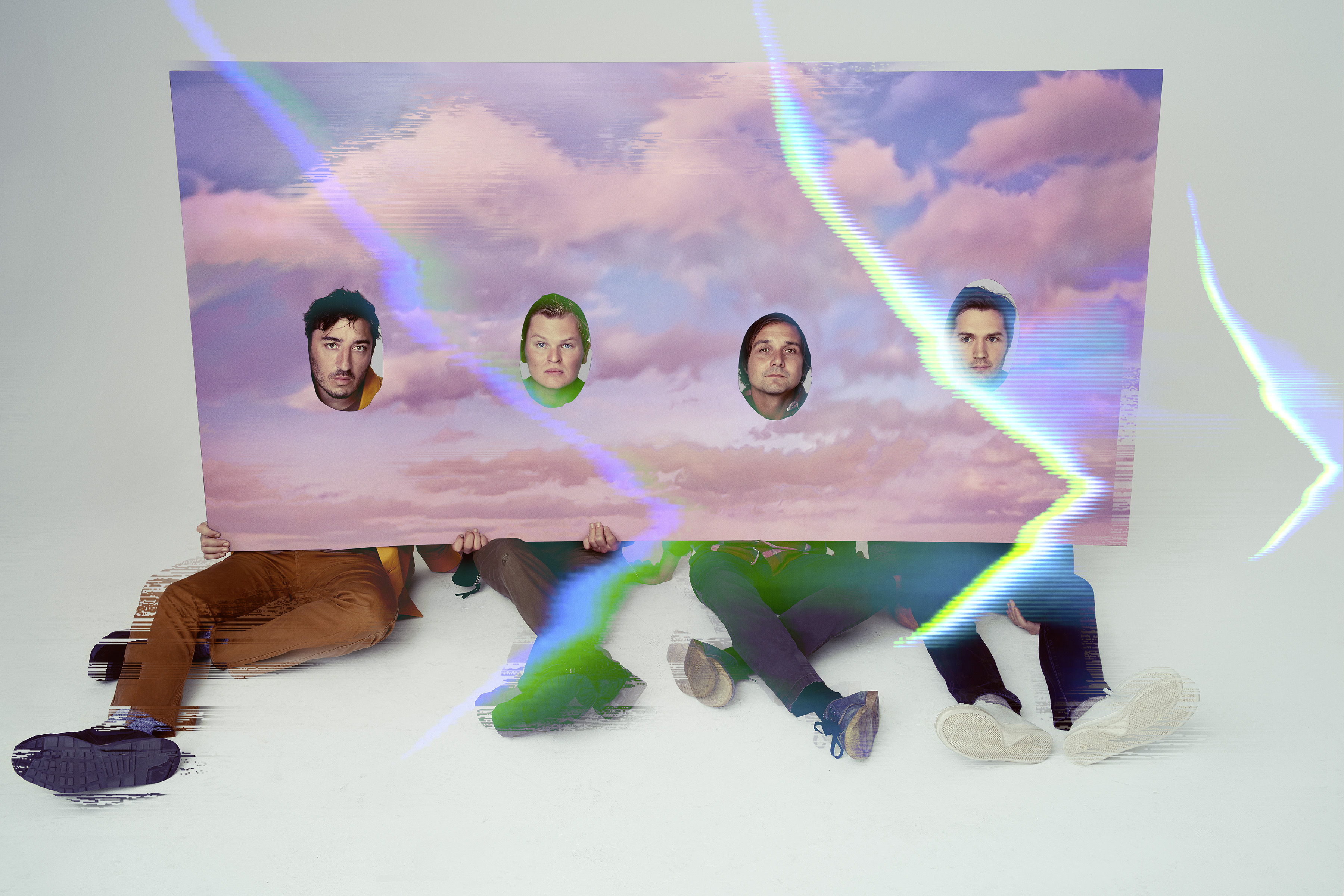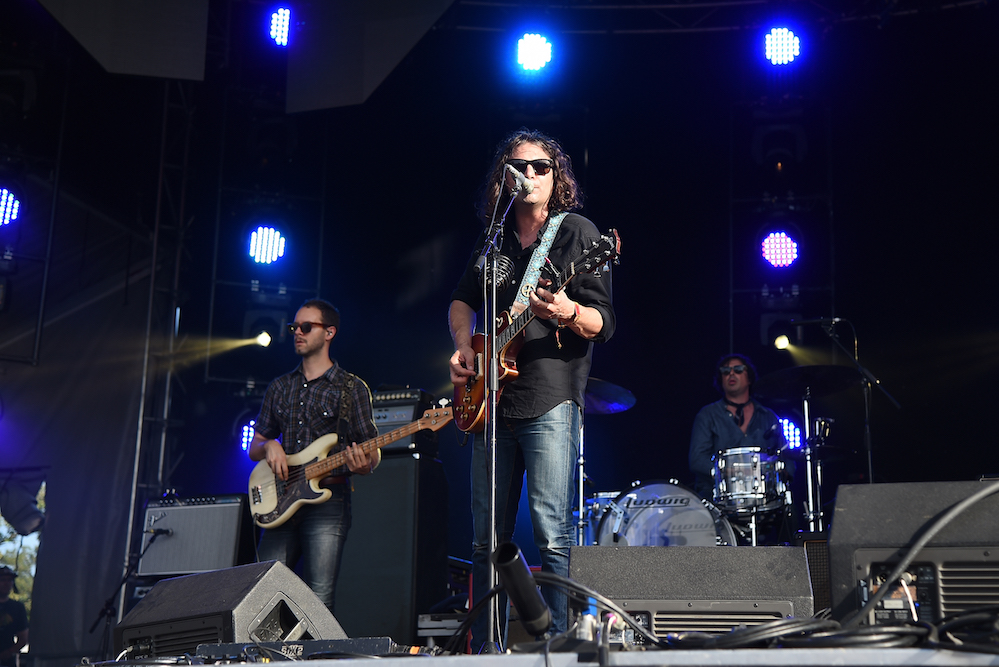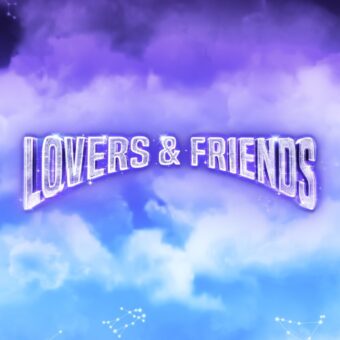If you suggest to Ed Droste and Daniel Rossen that their band, Grizzly Bear, has been away a long time, they’ll offer different readings of the situation. “I? ?can? ?name? ?like? ?ten? ?bands? ?that? ?took? ?longer times? ?to? ?come? ?back? ?this? ?year,” Droste tells me over a beer and salad at Manhattan’s Standard Highline hotel. Last decade, Droste was an ideal of waifish Brooklyn chic. When we meet, he looks happy, healthy, and West Coast tan, dressed in a casual outfit of t-shirt, shorts, and sandals to stave off the muggy New York heat. “?I? ?want? ?to? ?read? ?what? ?LCD? [Soundsystem] ?has? ?to? ?say,” he says with mock indignance. “?Feist.? ?Broken? ?Social? ?Scene. Fleet? ?Foxes,? ?they’ve? ?all? ?been? ?gone? ?longer.? ?What’s? ?their? ?excuse?”
Grizzly Bear’s last full-length, Shields, was released in 2012. Painted Ruins, their major label debut, will be released August 18 on RCA. In the time off, the band’s now-thirty-something members were busy, if not necessarily productive. “I was always writing,” Rossen, the band’s guitarist and other primary vocalist, says over the phone, while speaking from his Catskills property. “I tried some solo shows…[But] I was operating with zero structure and no end goal, which kind of meant that I just have all of these threads of ideas that I never finished. I was having a really hard time working in an applied way alone.” In 2015, the band began passing around files, and writing in small groups; by June 2016, they had enough material to head upstate to record a new album.
Rossen, who also owns a home in Santa Fe, and Droste, who resides in Silver Lake, are very apparently men who live extraordinarily different lives. They don’t see each other all that much anymore, outside of the band. Rossen was supposed to be in New York at the same time as Droste for interviews, but a car accident involving his dog forced him to stay home. (Thankfully, he assures me the dog will be okay.)
A little over ten years ago, they were twenty-somethings just out of NYU, packing into a cramped practice space in Williamsburg, Brooklyn to devise pastoral, adventurously structured pop songs together. The entire band–Droste, Rossen, bassist/multi-instrumentalist Chris Taylor, and drummer Chris Bear–all lived in New York for roughly a decade-and-a-half, when they weren’t sleeping on couches or a tent on the road. After a few years of shifting locations, Bear, Taylor, and Droste all recently coalesced in the Los Angeles area. Bear is raising a 1-year-old daughter in Eagle Rock. Taylor now lives Echo Park with his wife, after spending stretches in upstate New York, Germany, and Denmark over the past few years dabbling with a culinary career. Droste, who went through a divorce in 2014, has been a proud Californian for years now, as well as an avid hiker and (when he can afford it) world traveler.
The members of Grizzly Bear live quieter lives than they did five years ago, but their music sounds louder, cosmopolitan, and more state-of-the-art than ever. Forget the mid-aughts “freak folk” designations: On the album’s lead single and central Droste/Rossen collaboration, “Mourning Sound,” a funky Grizzly Bear announces itself, as Droste’s central melody and Taylor’s pneumatic bass feel crisper and more pop-oriented than anything else in their catalogue. Taylor’s own synth-drenched “Systole”–his first turn as lead singer–opens with a hypnotic strain of sing-song melody that sounds like it could have been repurposed from a Weeknd song. Bear’s drums throughout the album are high in the mix, evoking the thunderous John Bonham and, at subtler and jazzier moments, Tony Williams.
It’s certainly a far cry from Grizzly Bear’s early years: Before the band’s breakthrough with their lauded sophomore album Yellow House in 2007, the band’s primary percussive elements were one tom and some scattered finger snaps. (“God, we had so many effects pedals,” says Droste.) Still, the songs on Painted Ruins all retain the unusual, restless chord modulations, liturgical vocal harmonies, and swampy density that has characterized the band’s music throughout their career.
SPIN spoke with Grizzly Bear about how they managed to regain common ground for Painted Ruins after scattering across the country, how they settled on their groovier new sound, and how an indie band who reaped the full benefit of the music-blog “hype machine” functions in an era where that infrastructure feels so long gone.
Tell me what your time off from Grizzly Bear was like. What happened?
Ed Droste: It’s? ?mid-30s? ?life.? ?Everyone moved,? ?everyone? ?got? ?married.? ?I? ?got? ?divorced.? ?[Chris] Bear? ?had? ?a? ?kid.? ?Life happened, which? ?I? ?think? ?is? ?normal? ?and ?healthy? ?and?? ?good.? ?I? ?think? ?everyone? ?just needed? ?to? ?have? ?alone? ?time? ?and? ?have? ?a? ?sense? ?of? ?purpose? ?other? ?than? ?music.? ?But??? ?it? ?can? ?be? ?a? ?little confusing,? ?and? ?I? ?will? ?say? ?I? ?was? ?coming? ?back? ?to? ?a? ?totally? ?new? ?musical? ?format? ?being? ?like?, ?“What the? ?hell? ?is? ?this?”
What precipitated you guys? ?coming? ?back? ?together?
ED:? ?Chris? ?Taylor? ?was? ?sending? ?emails? ?being? ?like? ?“Hello?”? ?I? ?was? ?like,? ?”Yeah,? ?let’s? ?start. I’m? ?in.? ?I’m? ?here.? I’ve? ?processed? ?the? ?divorce; ?I’ve? ?lived? ?beyond? ?it.”? ?That? ?took? ?like? ?a whole? ?year? ?of? ?headspace? ?to? ?get? ?out? ?of.? ?I? ?couldn’t? ?focus? ?on? ?anything.?? ?I? ?couldn’t? ?even? ?read. I was, like, frozen. Bear and I would go to Cape Cod and work with the idea for two weeks, and then send it [to everyone else] over email. It’s no different from when we all lived in the city. We would never sit in a room and all stare at each other. I know some bands are jammin’ out. [mimes playing guitar] That’s so not how we work. If everyone’s in the room, it’s a little bit like too many cooks in the kitchen.
DR: Ed, especially, likes to work with a partner. I like doing that, but I like writing alone as well a lot. There were new versions of collaboration on this record which were cool–things like “Four Cypresses” was something that Chris Bear and I started together, which we’d never done before. I was trying to be more of a band member and assistant player as much as I could.
ED: Chris Taylor took a way bigger role in writing this time.
Was there anything in particular you were trying to get away from in the songwriting or arrangements?
DR: I was trying to avoid overly personal, depressing material, I’ll say that much. [I wanted to write] stuff that felt–not really topical, but not confessional. Sort of like using my own personal experiences to try and access something outside of my life. I like the idea of really literal scenes that are so small that they could almost mean anything. In “Wasted Acres,” lines like “howling at the fields” and “where does the hound run” is literally just me directly talking about the fields upstate, and collecting firewood with the dog. Or waking up and hearing passing trucks and people hunting in the woods in “Mourning Sound.”
I feel like many of the songs on Painted Ruins are groovier than anything you guys have done previously. You’re locking into these specific, driving backbeats–staying with them longer without as many moving parts to the song forms.
ED: I think [that] was just because we wanted to have fun. The last album was just not, generally speaking, a fun album to make. There were parts of it that were fun, but it was generally like an arduous, beating-your-head-over-and-over thing.
DR: [On] Shields, it was hard to get to the endpoint. It was almost like there were three or four different ideas of what that record was supposed to be, and all of us were like “that’s what it’s going to be.” It means the ideas are really forceful. I felt a lot of the time how that record played out, and it ended up being this kind of dark, moody record with a lot of space–it’s strange a lot of the time.
On this record, we were trying to avoid that kind of intensity. We were trying to have the demos worked out ahead of time, and have the songs more-or-less decided, so that we could approach it in a more workmanlike fashion. On records like Shields or even Veckatimest there were songs being written while we were recording the rest of it; everything was happening at the same time. If you’re in the right headspace, that can be great, but we just weren’t this time. Everyone was much happier throughout this process, which was really good.
ED: This is my favorite record that we’ve ever made, personally. We didn’t have a label [when we recorded it]; we were just like “If this is gonna happen, it’s gonna happen.” We’re a democracy; there’s no leader. The band would end if one person decides to bow out, which almost happened at a point. There are not a lot of bands now that are democracies.
I thought about that while listening to the record–it’s certainly way more uncommon that it was when you guys were first becoming popular.
ED: I felt like there was more when we started. Newer bands seem more solo-driven–definitely personality driven. That’s taken over. You need to have a look or shtick. We’re really going back to that vibe again. It’s interesting to see artists from our era try to jump into the pot–the glossy celebrity vibe. Not going to name any names, but there’s quite a few, quite a few examples where I’m just like “alright! Go for it!” Kinda weird, but hey.
?Even? ?since? ??Shields?,? ?a? ?lot? ?of? ?things? ?have? ?changed? ?for? ?being? a musician, and being ?in? ?a? ?rock? ?band, especially.
ED:? Do? ?bands? ?exist? ?anymore?? ?What’s? ?a? ?playlist?
Do? ?you? ?think? ?about? ?what? ?it? ?would? ?have? ?been? ?like? ?if? ?you? ?guys? ?had? ?been? ?starting? ?out now?
ED:? ?I? ?don’t? ?know? ?if? ?we? ?would? ?have? ?gotten? ?any? ?attention.? ?There’s? ?not? ?a? ?lot? ?of emphasis? ?put? ?on? ?bands? ?right? ?now.? ?I? ?can’t? ?imagine? ?with? ?today’s? ?climate? ?trying? ?to? ?push? something like Yellow House with? ? ?no? ?history? ?or? ?anything.? ?You? ?know,? ?I’d? ?like? ?to? ?think? ?someone? ?would? ?be? ?like,? ?“yay!”? ?or? ?even the? ?sites? ?that originally championed it? ??are? ?completely? ?different? ?now.? ??I? ?don’t? ?know? ?if? ?there’s? ?anyone who? ?can? ?break? ?bands? ?now.? You? ?have? ?to? ?get? ?Spotify? ?to? ?play? ?you,? ?or?—I don’t know what—?The? ?New? ?York Times? to do it. ?I? ?don’t? ?even? ?know? ?who? ?the? ?outlet? ?would? ?be? ?to? ?help? ?you; ?I? ?guess? everyone? ?collectively.? ?I? ?don’t? ?know? ?how? ?one? ?would? ?get? ?started without ?a? ?hype? ?machine.? ??I? ?have? ?a? ?ton? ?of? ?friends? ?in? ?L.A. who? ?are? ?like,? How? ?do? ?we? ?do? ?this?? ?I’m? ?gonna? ?shout? ?you? ?out? ?on? ?my? ?Instagram? ?story? ?and? ?put? ?you? ?on a? ?playlist … like,? ?I? ?don’t? ?know? ?what? ?else? ?I? ?can? ?do.?
Do you guys still share the music that you’re listening to with each other?
DR: My reference points in the last few years have been really weird, and I don’t know if they apply much to what we’ve been doing. I had a really odd phase a couple of years ago where I got into a bunch of early Dr. John records. It was just really out of realm with what means anything in music right now; guess that’s maybe that’s why it was appealing.
There’s definitely a couple of moments [on Painted Ruins] where you can hear a pretty clear Steely Dan energy. If anything, I was into accessing almost like weird, bad energy, and finding a way to use it in a way that isn’t campy or cheesy or cringe-worthy. Digging out of records like that, figuring out what still feels cool instrumentally. But certainly the other guys had a bunch of different reference points that had absolutely nothing at all to do with that.
Are you looking beyond this album cycle and the tour to what’s next? Are there any other people you want to collaborate with, or other musical things you might want to try in the future?
ED: I just want to see if it comes to me. Some have come to me that are really out there, and then I got scared, ‘cause it was a really big artist. Maybe I should’ve done it, but I just got nervous. I only really know how to work with my guys, basically. It’s intimidating, like “Aw, I might disappoint them.” Or if they have a weird energy, I might not be able to perform, and it would destroy another image of someone I admire.
Do you hang out with musicians that much at all these days?
ED: No. I got a couple of old-schools, but I kinda just steer clear of anyone that’s interested in being famous.
Do you think that comes with the territory nowadays?
ED: If someone is hungry for success and fame, generally speaking, they’re not a good friend, or not a good musician. I’m not here for the after-party. I was; I played around, had fun. Dabbled in the “Look who’s here! Look at who’s coming over!” Now, I couldn’t really give a shit. I don’t want to invest my energy into someone as friend who’s just looking out for number one all the time. Of course I’m gonna say “hi” to people at a festival, but I’m not, like, trying to get dinner. I have really great old friends who have nothing to do with the industry in any field, or maybe they’re just writing for a show or something–you know, behind the scenes. Those friendships tend to work out better.
As a band, did you think about trying to avoid streaming when it started happening? How do you feel about it now?
DR: I’m not against it on principle. The difference is I’m not so familiar with the world of playlisting–turning on Spotify, clicking on whatever genre, and just clicking on whatever playlist. A lot of people seem like they’re making music so that they can get on these playlists.
A lot has changed. I don’t know. There’s still some anxiety around that. I am a little bit baffled by just how much the record we are presenting ahead of time; it’s strange to me. I always want to make sure we’re preserving the album experience but because of the way streaming economy works, you’re releasing music for people to listen one at a time on a playlist and then hoping, once the record is out, that there will still be people that listen to it like an album.
ED: I love that it reaches parts of the globe where our physical CDs are not available ever, or the people who wouldn’t have the money to listen to it can listen to it. I don’t love how it’s making everyone have the shortest attention spans. It’s like dating apps–not that I’m on them, but when I talk to friends, it’s like, “What’s the next hit? What’s the next dopamine rush? Who am I gonna make out with next? Who’s gonna go on a date with me next? What album am I gonna get free next? What’s coming out next? What’s on this playlist?” You’re on a date, but you already know you’ve got like 20 other matches waiting for you on Bumble. At least music apps don’t reject you. I’m like, “Get off there if you don’t wanna feel sad!” Dark times.
I’m really glad I grew up when I did, I’ll say that. Not sound like some old fogey like, “The old days!” but I’m really glad that I can remember buying a CD or a cassette tape–unpacking it, and the excitement, saving up for it when I was little. And being like, “I’m going to take the bus to Harvard Square, and I’m gonna buy this Edie Brickell cassette. I’ll come home–because I can’t even listen to it on the bus–and put it on my stereo and sit there and listen to it.” I don’t do that anymore, but I’m glad that I had that memory of what it meant then. We all change. My mom looks at her phone as much as I do; it affects every age.
I have to remind myself when I buy it: Give it fucking five listens. Unless it’s just a genre where you’re like, “I’ll never like that song, so like why am I even trying this?” Like, I’m just not into garage rock. But if it’s something that I usually like, and I’m confused about it, I’ll listen–listen while you’re doing the dishes, or listen in your headphones, or while you’re driving.
That reminds me for something I’ve heard you say before: that you’re very album-focused in your listening, and with writing music for Grizzly Bear–that you think of your music not being “immediate,” and that a lot of it only really click after a few listens through to the album.
ED: We don’t deliberately try to make music that’s not immediate; it’s just sort of how it ends up being. We don’t want to force anything, because then it’s not fun for us to play and I feel like, generally speaking, people smell the bullshit like a mile away. Although I feel some bullshit’s happened [recently] and people weren’t smelling it, so I don’t know. Not on our part. Maybe I’m wrong. Maybe people’s bullshit detectors are all out of whack now, I don’t know. Do I sound cynical?
Do you feel cynical?
ED: No. I mean, it’s just funny. I’m just lucky to be here. I’m happy to have a beer with you and chat about it. I’m proud of [the album]. I can stand behind it, what we’ve done. All I can do is tour and do the best I can, in this world. Is anyone listening? Is anyone gonna read this?





